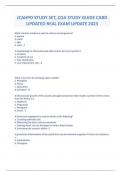Popular courses 'COA' at COA
COA Study guides, Class notes & Summaries
Looking for the best study guides, study notes and summaries about COA? On this page you'll find 416 study documents about COA.
All 416 results
Sort by
JCAHPO STUDY SET, COA STUDY GUIDE CARD UPDATED REAL EXAM UPDATE 2023
 Popular
Popular
-
Certified Ophthalmic Assistant (COA) Final Exam with Verified Answers
- Exam (elaborations) • 71 pages • 2024 Popular
- Available in package deal
-
- $18.49
- 1x sold
- + learn more
Certified Ophthalmic Assistant (COA) Final Exam with Verified Answers How are systemic medications administered? - CORRECT ANSWER-Orally, injection (subcutaneously or intramuscularly) or intravenously How should drops be properly instilled into a patient's eye? - CORRECT ANSWER-Into the lower cul de sac (lower fornix) What does the term idiosyncrasy refer to with ophthalmic drugs? - CORRECT ANSWER-A bizarre, peculiar reaction to a drug that is not commonly seen, such as tremors, exci...

-
Certified Ophthalmic Assistant (COA) Final Exam Questions With Revised Correct Answers < UPDATED & ALREADY PASSED >
- Exam (elaborations) • 222 pages • 2024
-
- $17.99
- + learn more
Certified Ophthalmic Assistant (COA) Final Exam Questions With Revised Correct Answers < UPDATED & ALREADY PASSED > How are systemic medications administered? - ANSWER : Orally, injection (subcutaneously or intramuscularly) or intravenously How should drops be properly instilled into a patient's eye? - ANSWER : Into the lower cul de sac (lower fornix) What does the term idiosyncrasy refer to with ophthalmic drugs? - ANSWER : A bizarre, peculiar reaction to a drug tha...

-
Certified Ophthalmic Assistant Exam with 100%Correct Answers 2024, Certified Ophthalmic Assistant Exam 2024 with 100%Correct Answers & Certified Ophthalmic Assistant Exam | 190 Questions And Answers (100% Verified Solutions).
- Package deal • 3 items • 2024
-
- $30.49
- + learn more
Certified Ophthalmic Assistant Exam with 100%Correct Answers 2024, Certified Ophthalmic Assistant Exam 2024 with 100%Correct Answers & Certified Ophthalmic Assistant Exam | 190 Questions And Answers (100% Verified Solutions).

-
Certified Ophthalmic Assistant Exam with 100%Correct Answers 2024, Certified Ophthalmic Assistant Exam 2024 with 100%Correct Answers & Certified Ophthalmic Assistant Exam | 190 Questions And Answers (100% Verified Solutions).
- Package deal • 3 items • 2024
-
- $30.49
- + learn more
Certified Ophthalmic Assistant Exam with 100%Correct Answers 2024, Certified Ophthalmic Assistant Exam 2024 with 100%Correct Answers & Certified Ophthalmic Assistant Exam | 190 Questions And Answers (100% Verified Solutions).

-
Certified Ophthalmic Assistant Exam With Correct Answers
- Exam (elaborations) • 17 pages • 2024
-
- $12.49
- + learn more
QUESTION #1 Which of the following conditions is NOT hereditary? A. Migraines B. Diabetes C. Nystagmus D. Conjunctivitis - D. Conjunctivitis QUESTION #2 Which part of the patient examination is performed by asking specific questions in an orderly sequence? - A. History QUESTION #3 What is an important question to ask a patient that complains of a "red eye"? - A. Do you have blurred vision? QUESTION #4 The term used to rear to symptoms due to uncorrected refractive error is .....

-
Certified Ophthalmic Assistant COA With Correct Answers
- Exam (elaborations) • 10 pages • 2024
-
- $12.49
- + learn more
Vitreous - Jelly-like substance that fills the middle of the eye. Eye Floaters - Tiny clumps of cells or other material inside the vitreous. These look like small specks, strings or clouds moving in your field of vision. Age-Related Macular Degeneration (AMD) - Leading cause of severe, irreversible vision loss in people over 60. It occurs when the small central portion of the retina, called the macula, deteriorates. People will lose their central vision but can still see out of their perip...

-
COA Study Guide Questions And 100% Correct Answers
- Exam (elaborations) • 17 pages • 2024
-
- $13.49
- + learn more
Name the nine components of the ophthalmic history. - Chief complaint, present illness, past ocular history, ocular medications, general medical and surgical history, systemic medications, allergies, social history, and family history. Why is it important to specifically ask a patient about the medications they are taking? - Because certain medications may affect the eyes. What is the proper response to a patient's request from the ophthalmic technician for medical advice or a diagnosis? ...

-
Certified Ophthalmic Assistant Exam Review with questions and answers
- Exam (elaborations) • 19 pages • 2024
-
- $12.49
- + learn more
A history is obtained by: a. asking a series of organized & specitic questions b. observing the patient's actions in the exam room c. allowing the patient to discuss anything he or she wishes d. asking the same question of each patient during every exam -ans-- A. asking a series of organized & specific questions The history should be recorded: a. by writing down the patient's entire story, word-for-word b. by condensing the patient's story, including pertinent facts c. by inter...

-
Certified Ophthalmic Assistant Exam Review with complete answers
- Exam (elaborations) • 19 pages • 2024
-
- $12.99
- + learn more
with complete answers A history is obtained by: a. asking a series of organized & specitic questions b. observing the patient's actions in the exam room c. allowing the patient to discuss anything he or she wishes d. asking the same question of each patient during every exam -ans-- A. asking a series of organized & specific questions The history should be recorded: a. by writing down the patient's entire story, word-for-word b. by condensing the patient's story, incl...

-
Certified Ophthalmic Assistant (COA) And Answers
- Exam (elaborations) • 69 pages • 2024
-
- $14.49
- + learn more
How are systemic medications administered? - Orally, injection (subcutaneously or intramuscularly) or intravenously How should drops be properly instilled into a patient's eye? - Into the lower cul de sac (lower fornix) What does the term idiosyncrasy refer to with ophthalmic drugs? - A bizarre, peculiar reaction to a drug that is not commonly seen, such as tremors, excitability or even collapse What is the name of the instrument used to neutralize lenses? - Lensometer (Lensmeter) W...

-
Certified Ophthalmic Assistant (COA) A Graded Exam
- Exam (elaborations) • 69 pages • 2024
-
- $14.49
- + learn more
How are systemic medications administered? - Orally, injection (subcutaneously or intramuscularly) or intravenously How should drops be properly instilled into a patient's eye? - Into the lower cul de sac (lower fornix) What does the term idiosyncrasy refer to with ophthalmic drugs? - A bizarre, peculiar reaction to a drug that is not commonly seen, such as tremors, excitability or even collapse What is the name of the instrument used to neutralize lenses? - Lensometer (Lensmeter) W...

Did you know that on average a seller on Stuvia earns $82 per month selling study resources? Hmm, hint, hint. Discover all about earning on Stuvia



